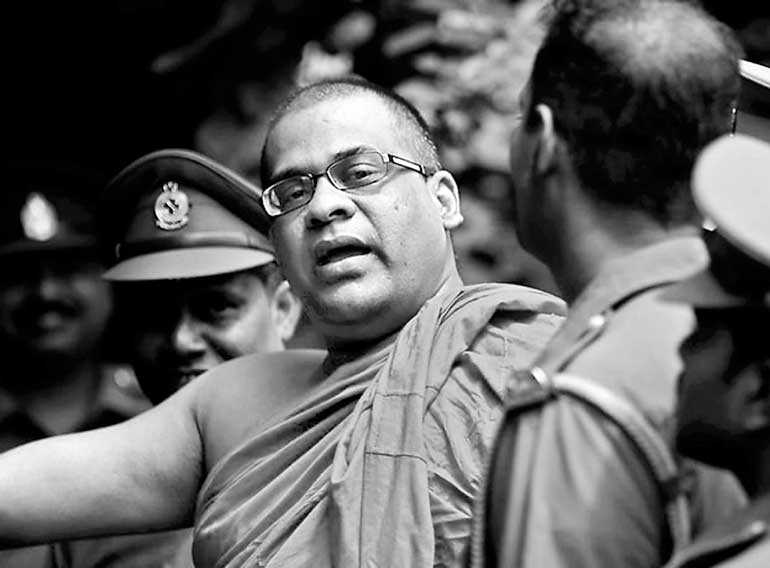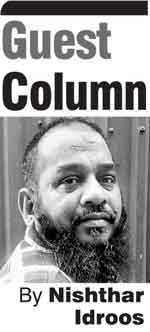Friday Feb 13, 2026
Friday Feb 13, 2026
Saturday, 2 February 2019 00:10 - - {{hitsCtrl.values.hits}}

BBS General Secretary Ven. Galagoda Aththe Gnanasara
 The disorderly and bellicose reverend with an irrepressible proclivity for vitriol and incitement met his waterloo of all places inside a courthouse.
The disorderly and bellicose reverend with an irrepressible proclivity for vitriol and incitement met his waterloo of all places inside a courthouse.
Bodu Bala Sena (BBS) General Secretary Ven. Galagoda Aththe Gnanasara shouted at the presiding Judge and lawyers as the accused military men of the murder of journalist Prageeth Ekneligoda were refused bail. On the same day he also threatened the wife of the missing journalist, Sandhya Ekneligoda.
A kind of a constitutional and moral irony lingers in this whole hideous saga. Prima facia evidence of breach of peace, arson, anarchy, violence and loss of life are second rated and interred for contempt of court.
Contempt of court no doubt is a serious offence according to Sri Lankan law for that matter any court of law. The misguided monk also demonstrated a spirited penchant to demonise, discredit and distort other faiths and their teachings contrary to the very foundations of his own, wantonly inflicted irreparable harm to Buddhism and its adherents. Never in Sri Lanka’s history have we witnessed such militancy emerging from an individual/adherent of such a peaceful philosophy.
He took this issue of communalism to extreme lengths, often unleashing violence repeatedly. Four innocent lives were lost in the infamous Aluthgama incident. Scores of Muslim businesses became victims of arson and pillage. Lies, deception, falsification and outright dishonesty were effortlessly hurled and no time or space was extended to the victims to defend themselves or protect their businesses.
He certainly was not working alone, it was an open secret that there was an entire system backing him up rock solid. The whole process was well lubricated with money, machinery, material, merchants and misinformation.
The most knowledgeable Gnanasara Thero got down his Burmese counterpart the most pious Ashin Wirathu and threw quite an exhibition. An elaborate spectacle of Buddhist machoism with a definite will to instil fear in minorities, especially Muslims, took root.
Ahsin Wirathu was a notorious communal leader of the anti-Muslim movement in Myanmar. He has been accused of conspiring to persecute and kill Muslims in Myanmar through his speeches and actions. Hundreds if not thousands of Muslims perished as a result of his active involvement.
 “Hatred does not cease through hatred at any time. Hatred ceases through love. This is an unalterable law.” This quote is common and it’s a genuine scriptural quotation. It’s from verse 5 of the Dhammapada. If incarceration had healed the reverend Thero, it’s time he comes out and serves his community at the next available opportunity, whether it’s a general pardon or presidential amnesty.
“Hatred does not cease through hatred at any time. Hatred ceases through love. This is an unalterable law.” This quote is common and it’s a genuine scriptural quotation. It’s from verse 5 of the Dhammapada. If incarceration had healed the reverend Thero, it’s time he comes out and serves his community at the next available opportunity, whether it’s a general pardon or presidential amnesty.
“Let them pardon and overlook. Would you not love for Allah to forgive you? Allah is Forgiving and Merciful” (Al Quran 24:22) The Messenger of Allah, (peace and blessings be upon him) said: “Be merciful to others and you will receive mercy. Forgive others and Allah will forgive you” (Musnad Ahmad 7001, Grade: Sahih)
The ability to forgive is a distinguished trait in a human being. It elevates him in great measure. Seen as evidence of how high humans rank in the chain of beings. Animals don’t forgive, they’re bereft of such faculties though some humans behave worse than animals. Yes it obviously conveys a moral superiority. Most cultures embellish the virtue of forgiveness, it’s associated with religiosity, magnanimity, spiritual growth of a people. In this respect Buddhism occupies a very important place.
Webster’s Third New International Dictionary defines forgiveness in this manner: “To cease to feel resentment against on account of a wrong committed.” This definition is poignantly illustrated in a well-known Tibetan Buddhist story about two monks who encounter each other some years after being released from prison where they had been tortured by their captors. “Have you forgiven them?” asks the first. “I will never forgive them! Never!” replies the second. “Well, I guess they still have you in prison, don’t they?” says the first.
Forgiveness essentially a spiritual practice not necessarily forthcoming in an inveterate hedonist or callous legislator whose numbers on planet earth are larger and greater. Their embrace of the world so entrenched and adhesive. They pave the way for their own offspring to succeed with the same kind seizure and squeeze. Build dynasties and eliminating than forgiving those who oppose and critique them for the ownership of this palpably impermanent world.
Arriving in Sri Lanka or living in Sri Lanka one gets a sense as if you are filled with religiosity and compassion on account of both the human contact and the public display of symbols. No doubt the Buddhists of Sri Lanka a very forgiving people. It’s the politics and politicians and more specifically their political ambitions that contributes to the toxic milieu.
Gnanasara Thero who was jailed on 8 August 2018 for six years was a victim of local politics and politicians. He gleefully accepted the role he was asked to play and when he tried to overdo had to pay the price.
As a cardinal rule members of the clergy and all those overtly representing faiths are hereby politely and cordially requested to keep a good distance between politicians. If you are in need of the politician’s dough to purchase the latest driving machine to do your errands you must be prepared to defend the politician at all times at least by remaining quiet. This is the only way the distinguished members of the clergy can maintain their integrity and dignity. I am reminded of a true incident involving one of the greatest scholars of Islam in this era from the kingdom of Saudi Arabia. This is what makes a true scholar. Story of Shaykh Ibn Uthaymeen (d. 2001) Rahimahullah, may Allah have mercy on him. When the Saudi King Khalid and then Crown Prince Fahad visited him in his humble mud house, looking at the crude structure of the house, the King wished to gift him a new house, and offered to build him a palace. The Shaykh responded, “I appreciate the offer, may Allah reward you! But I’m already building a house in Salihiyya” (an area of his city).
The King insisted on doing something for him, to which the Shaykh said, “If you must, then please build a hostel for my students to live in, for otherwise they are living in the masjid and that is difficult for them.” At this, the King turned to his entourage of accompanied clergy and remarked in the local Arabic vernacular, “You see? This is what you call a real scholar!” meaning that the people who sought fame and money for the sake of religion were not true scholars.
After the King left, his students asked him, “Shaykh, we didn’t know you were building a house in Salihiyya?” He replied, “Don’t you know the graveyard is in Salihiyya?” They said, “Yes.” He said, “So I am building a house for my afterlife over there.” May Allah bless the Shaykh and raise his ranks.